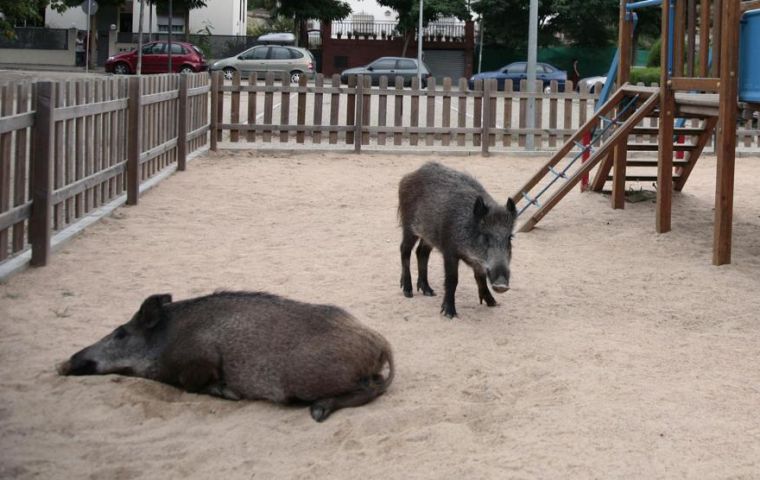MercoPress. South Atlantic News Agency
Wild animals are slipping to explore empty streets of lock-downed cities
 Wild boar have descended from the hills around Barcelona in Spain while sika deer are nosing their way around the deserted metro stations of Nara in Japan.
Wild boar have descended from the hills around Barcelona in Spain while sika deer are nosing their way around the deserted metro stations of Nara in Japan. With humans retreating into their homes as more and more countries go under coronavirus lockdown, wild animals are slipping cover to explore the empty streets of some of the biggest cities. Wild boar have descended from the hills around Barcelona in Spain while sika deer are nosing their way around the deserted metro stations of Nara in Japan.
Senglars x balmes.. o se li ha escapat la misèria al @JoelJoanJuve o els animals ja saben q estem tancats #coronavirus #barcelona pic.twitter.com/UGFhlh376T
— Jordi Puig (@putxy32) March 19, 2020
Indian social media has gone wild over footage of a stag scampering through Dehradun, the capital of the northern state of Uttarakhand.
Gangs of wild turkeys have been strutting the streets of Oakland in California while a puma turned up in the centre of the Chilean capital Santiago, which is under curfew.
“This is the habitat they once had and that we've taken away from them,” said Mr Marcelo Giagnoni, head of Chile's agricultural and livestock service, which helped the police capture the curious big cat.
While sightings of dolphins in Venice's canals turned out to be fanciful, they have been popping up in ports elsewhere in the Mediterranean as emboldened wildlife takes “free rein to wander our cities and towns”, said Mr Romain Julliard, head of research at the French Natural History Museum.
He said foxes were at the vanguard of the new urban explorers. “They change their behavior very quickly. When a place becomes quiet, they're straight in there.”
Animals and birds that normally live in urban parks, like sparrows and pigeons, are also more likely to venture beyond their usual territories, Mr Julliard said.
While the dawn and dusk choruses have been bringing comfort to quarantined city dwellers, the museum's acoustics specialist Jerome Sueur said that does not mean there are more urban birds than before. It is more that with reduced traffic noise they can be heard better.
And the timing could not have been better, as these animals embark on their mating season. With the hunting season suspended in several European countries, this promises to be a spring and possibly a summer of love for the animal kingdom.
It is certainly great news for species like the common toad and the spotted salamander. The amphibians are being spared from being “crushed crossing busy roads” in their haste to find a mate, said Mr Jean-Noel Rieffel of the French biodiversity office.
With few dog walkers to disturb them, fawns are getting an idyllic start to life, while birds such as Mediterranean gulls which nest along the sandy banks of rivers are being left undisturbed.
In the Calanques National Park overlooking the Mediterranean near Marseille in France, wildlife “is reclaiming its natural habitat with surprising speed”, said the park's president Didier Reault.
And in the cities and suburbs, un mown lawns will be a source of “bounty for bees, bumble bees and butterflies”, Mr Julliard said.




Top Comments
Disclaimer & comment rulesCommenting for this story is now closed.
If you have a Facebook account, become a fan and comment on our Facebook Page!